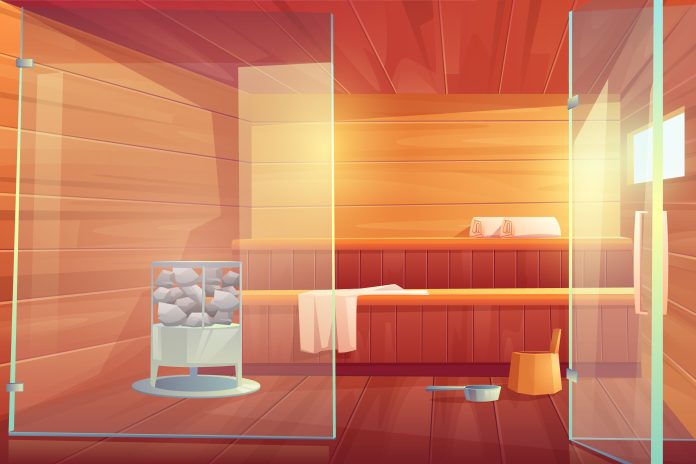
This post may contain affiliate content from which we earn a small commission at no additional cost to you. Read our full disclosure.
Curious about choosing the right sauna heater? Today, let’s dig into the Electric vs. Wood-Burning sauna heater showdown. It’s not just about cranking up the heat; it’s about discovering your ideal sweat sidekick.
Join us on this journey into the sauna realm as we weigh the pros and cons, helping you figure out which heater aligns with your steamy preferences.
Ready to decipher the warmth – Choosing the Right Sauna Heater: Electric vs. Wood-Burning is waiting for your decision!
Understanding Electric Sauna Heaters
Electric sauna heaters have gained popularity for their convenience and ease of use. They operate by converting electrical energy into heat, creating a consistent and controlled sauna environment. The installation process for electric heaters is relatively straightforward, making them a popular choice for those seeking a hassle-free setup.
One notable advantage of electric sauna heaters is their rapid heat-up time. With just the flip of a switch, electric heaters can quickly elevate the temperature in your sauna, providing instant gratification for those impromptu sauna sessions.
Additionally, electric heaters allow precise temperature control, enabling users to tailor the sauna experience to their preferences.
Cost Considerations with Electric Sauna Heaters

While electric sauna heaters offer convenience, it’s essential to consider the long-term cost implications. Electric heaters tend to have higher operational costs compared to their wood-burning counterparts. The ongoing electricity expenses may accumulate, impacting your overall budget.
Moreover, if you experience frequent power outages or have concerns about environmental sustainability, reliance on electricity might raise some issues. It’s crucial to evaluate your priorities and budget constraints before committing to an electric sauna heater.
The Allure of Wood-Burning Sauna Heaters
On the other end of the spectrum, wood-burning sauna heaters appeal to enthusiasts seeking a more traditional and authentic sauna experience. The aromatic scent of burning wood, the crackling sounds, and the slower heat-up time contribute to a unique and immersive sauna atmosphere.
Wood-burning heaters offer a connection to nature and a sense of ritual that some find deeply satisfying. Choosing this option requires a bit more involvement, as you’ll need to manage the fire and maintain a stock of suitable wood. However, for those who appreciate the hands-on approach, this can be a fulfilling aspect of the sauna ritual.
Environmental Impact of Wood-Burning Sauna Heaters
While the connection to nature is a positive aspect of wood-burning saunas, it’s essential to address the environmental impact. The combustion of wood releases carbon dioxide, contributing to the carbon footprint.
If sustainability is a priority for you, exploring eco-friendly wood-burning options or considering the use of responsibly sourced wood becomes crucial.
Installation and Space Considerations
The installation process for wood-burning and electric sauna heaters differs significantly. Electric heaters are generally easier to install and may require minimal space. They are suitable for indoor or urban settings where wood burning might not be feasible or permitted.
On the contrary, wood-burning heaters demand proper ventilation and clearance space, as safety is paramount when dealing with an open flame.
Consider the available space, building codes, and ventilation options in your sauna area before deciding on the type of heater. Planning for these considerations in advance can save you from potential headaches during installation.
Maintenance and Longevity

Maintenance is a crucial aspect of any sauna heater, and the requirements for electric and wood-burning options differ. Electric heaters typically have fewer components that require regular maintenance. On the other hand, wood-burning heaters demand attention to the firebox, chimney, and ventilation to ensure optimal performance.
Consider your willingness and ability to perform routine maintenance tasks when choosing between the two options. Additionally, think about the longevity of the heater and the availability of replacement parts, as this can impact the overall cost of ownership.
For more information, you can read our article “How to maintain your home sauna”.
Personal Preference and Sauna Ritual
Ultimately, the choice between electric and wood-burning sauna heaters comes down to personal preference and the sauna experience you envision. If you seek modern convenience, rapid heating, and precise temperature control, electric heaters may be the ideal choice.
Alternatively, if you crave the authenticity, ritualistic experience, and aromatic ambiance of a wood-burning sauna, the extra effort involved may be well worth it.
Social Aspect and Gatherings
Electric sauna heaters offer quick heat-up times and precise temperature control, making impromptu gatherings enjoyable and spontaneous. Their convenience simplifies sharing the sauna with friends and family without extensive planning.
In contrast, wood-burning sauna heaters promote a deliberate and communal approach, involving tending to the fire and waiting for the sauna to reach the desired temperature. This slower pace fosters a sense of togetherness, turning the process into a shared activity.
Consider your sauna’s purpose: if you value convenience for socializing, electric heaters are ideal; if you seek a more deliberate, communal experience, the ritualistic nature of wood-burning heaters may enhance the overall ambiance.
Aesthetic Appeal and Design Integration
The aesthetic allure of saunas is pivotal in decision-making. Electric heaters, being compact and space-efficient, offer design flexibility, allowing focus on lighting, seating, and materials. Wood-burning sauna heaters, with their rustic charm and visible flames, add an irresistible aesthetic.
The stove becomes a focal point, imparting character and warmth to the sauna space. Consider overall design and ambiance preferences when choosing between electric and wood-burning options. The decision impacts the sauna’s visual appeal and contributes to the desired atmosphere.
Wrap-Up (Choosing the Right Sauna Heater: Electric vs. Wood-Burning)
In the cozy world of saunas, the choice between electric and wood-burning heaters boils down to personal preferences. Electric saunas are a breeze to use while wood-burning ones offer a rustic charm. So, whether you lean towards the modern ease of electricity or the traditional allure of wood, both options promise a steamy escape.
It’s your sauna, your heat, your retreat. Cheers to the perfect warmth. You can check out our full review of Sun Home Saunas for more sauna information. Get your personal sauna by just clicking here.
If you’re interested, make sure to save yourself some cash with the code below.


Sun Home Saunas
FAQs (Choosing the Right Sauna Heater: Electric vs. Wood-Burning)
Is a wood-burning or electric sauna better?
Choosing between a wood-burning and electric sauna is a matter of preference. Wood saunas offer a traditional feel, while electric ones provide convenience with quick heat control.
What type of heater is best for a sauna?
The best sauna heater depends on your needs. Wood-burning heaters create an authentic experience, while electric heaters offer quick and easy temperature control.
Is a wood stove better than electric heat?
Comparing a wood stove to electric heat in a sauna depends on your desired experience. A wood stove provides a natural ambiance, while electric heat is practical and consistent. Consider your priorities for the right choice.
- Online Vs In-Person Certification Courses: Pros & Cons - April 23, 2024
- Tips for Acing Your Fitness Certification Exam - April 21, 2024
- Balancing Work-Life as a Fitness Trainer: Complete Guide - April 19, 2024
Disclosure: In the spirit of full disclosure, DIYactive.com may be compensated in exchange for featured placement of certain reviews or links on this website. View our full disclosure.



